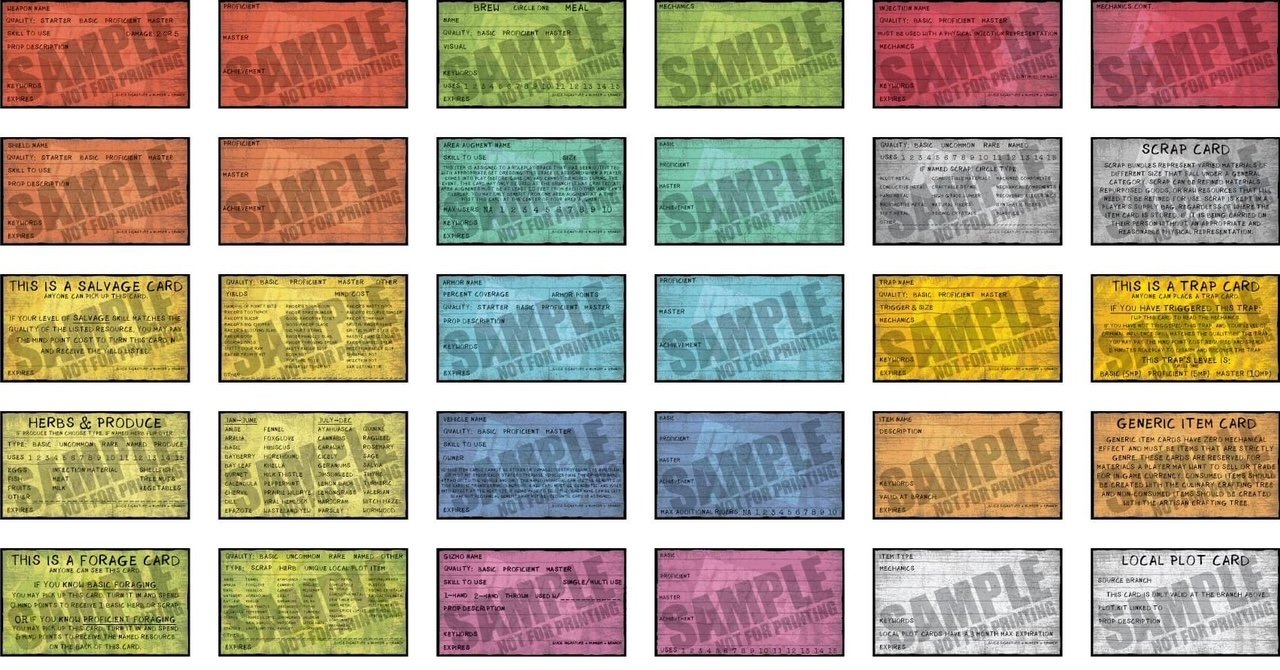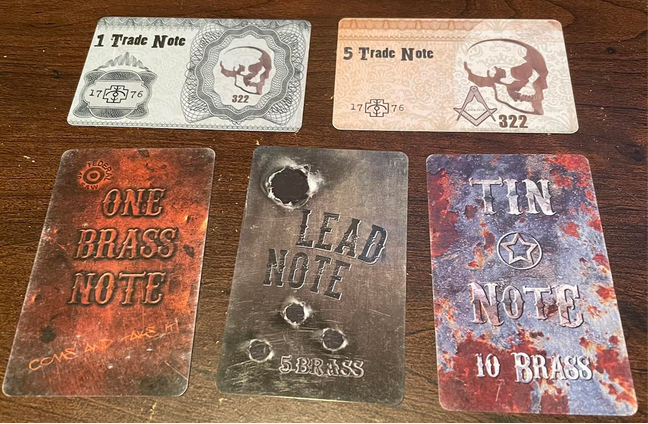Item Cards
YOU can find the complete rules for item cards in the Guide’s Guide starting on pagE 86.
A big part of keeping the Dystopia Rising game fairly rules-light is the use of ITEM CARDS to represent mechanical effects past what your character sheet and Skills can cover.
Item Cards you find in game will be approximately the size of a standard business card. If you lose the Item Card (or accidentally wash it after a game), you lose the item too — so keep them safe! Many players will have elaborate card boxes or binders to organize their cards, but some will just shove them into a pocket of their costume, attach them to a phys rep, or put them into their Supply Bag.
sample item cards
Item Cards will be pretty obvious, but so you know what to look for we’ve included some examples below. Many of the cards will even have a few of the relevant rules printed on them for easy reference later.
These are examples of the cards used in the 3.0 mechanics. Actual DR Live cards will appear slightly different, but both will be used in game while supplies last of the previous edition cards.
There are several types of Item Cards you will see in game:
Scrap - These represent bits of metal and useful materials for weapons and engineered items. These items normally don’t expire and are used in most Artisan Blueprints. You can acquire these items via the skills Salvaging, Foraging, and Travel.
Herb & Produce- These are plants, vegetables, and seasonal herbs used in a variety of Culinary Blueprints and even some Artisan Blueprints. You can acquire these items via the skills Foraging, Travel, Agricultural, and some rare Lineage Advantages.
Armor - These are items that provide additional Body to protect you from threats. Once they run out of Body points, they must be repaired by a character with the Artisan skill. These are made with the Artisan skill and require large amounts of scrap to create.
Brews - These are single-use items that provide a variety of effects from healing, Mind restoration, or temporary buffs. These are made with the Culinary skill and expire more quickly than most other items.
Foraging Cards - These items represent scavenged items found in the wasteland and can be turned in at the Post Office for various scraps, herbs, and Natural Resources. These items can be found hidden around the site, or generated via certain skills or Blueprints.
Injectables - These are Brews that can be used by a character already in Bleed Out. They are expensive and some can cost Resolve to use but are one of the only ways to save yourself if you are dying alone. Some expensive Injectables can even restore your uses of Impact Skills or Profession Impact Skills. These are made with the Culinary skill.
Gizmos - This is the most versatile card type, as it covers everything from small handheld engineered items, single use items like smoke bombs or disguise kits, and more. These are made with the Artisan skill.
Meals - These short-lived items allow for efficient healing and Mind restoration but expire at the end of three months. Many meals are only useable by certain Lineages, but the most powerful Meals will be useable by any character. These are made with the Culinary skill.
Room Augments - These are expensive and powerful augments to buildings in the game. Generally they improve a 10’x10’ area, and you must provide the appropriate props to decorate the space. These are made with the Artisan skill.
Necrology Resources - These items are incredibly rare, are produced in limited quantities, and have their use and production standardized across the network. These can only be generated by player skills and include Imprint Crystals, Mycelium Wiring, Mortis Extract, Festering Crystals, and Grave Flesh.
Necrology Crafted Items - These are rare and valuable items that can only be generated by powerful Profession Skills. These items don’t normally expire but instead have a number of uses that can be expended while in a Mortis Amaranthine space. These items must be crafted within the Morgue itself, at a Necrology Crafting Station with the Profession Skills The Organic Machine or The Living Experiment.
Non-Mechanical Items - These are items that have no in-game effect but are often used as components of larger and more expensive items. These can also represent a way for you to provide a card for a neat prop or real-life item you’d like to sell to other players. These are made with both the Artisan and Culinary skills.
Shield - These are protective items used to block attacks in combat. Crafted shields also provide additional abilities for those that have higher tiers of the Shield skill. These are made with the Artisan skill.
Trap - These items can make opening a box or crate that doesn’t belong to you the last thing you do. Traps can be placed on containers, stretched across areas as a trip line, or even concealed under a pressure plate. Traps must be represented by a physical prop of some kind, but should never be actually dangerous gadgets in real life — use the card instead! These are made with the Artisan skill.
Weapon - These are one of the first items most characters acquire in game, as it is a boffer LARP after all. Crafted weapons also provide additional abilities for those that have higher tiers of the various weapon skills. These are made with the Artisan skill.
Vehicle - These are very expensive items that will require most characters spending several games gathering resources to make them. They never enter play directly but have several powerful effects that represent their influence on the game space. These are made with the Artisan skill.
There are two other types of items you’ll encounter in game, each represented by their own unique physical representations:
Blueprints - These are recipes and schematics for how to build another item in the game. These are commonly printed on blue cardstock, thus the name. You must have an appropriate Blueprint to build 95% of the items in the game.
Crafting Zone Blueprints are available at every Culinary and Artisan Crafting Zone in the game. These two blueprints contain common recipes and plans for crafting components and other ways to generate items needed in more advanced Blueprints, and includes the Forging process for combining and making new types of Scrap.
Culinary Blueprints allow you to craft items with the Culinary skill, including brews, injectables, and meals. These generally require Herb and Produce to craft. These are some of the few ways to restore lost Mind and Body without needing Skills.
Artisan Blueprints allow you to craft items with the Artisan skill, including weapons, armor, shields, gizmos, room augments, vehicles, traps, and more. These generally require Scrap to craft and are one of the most numerous types of Blueprints in the game.
Benediction Blueprints allow you use faithful Skills in new ways and often providing new ways to enhance or protect other members of your chosen faith. While some of these blueprints will require specific Aberrant skills to use, many Benedictions simply require you to be Inducted into that faith, allowing you to role play as a priest of your faction without having to take psionic abilities.
Criminal Blueprints allow you to generate various illicit and illegal items, including drugs, poisons, bombs, and various deadly traps. There are three types of Criminal Blueprints, General, Black Market, and Murder Inc. General Criminal blueprints can be used by any character with Criminal Influence, while the others require membership in a specific faction as outlined in the Basic Criminal Influence skill in the Player’s Guide.
Necrology Blueprints are powerful and niche blueprints that allow specific interactions with Morgues and the Mortis Amaranthine. These items require expensive and rare materials known as Necrology Resources to produce, which can only be gathered or generated by player skills — never a plot or other game mechanic. Necrology items usually don’t expire, but have a number of uses before they are expended.
Currency - These are printed on thick plastic cards and represent the in-game money used by characters and organizations in the world. Each chapter has its own local currency, and many players collect the various different types of currency in the game.
Brass (฿) - The currency of the San Saba Territories is the Brass Note. This comes in three varieties, the single currency Brass Note, the five currency Lead Note, or the ten currency Tin Note, and the twenty currency Steel Note. These can be generated by the Financial Influence skill, the Elitariat Strain advantage, or by simply trading goods and services with other players.
Trade Notes - The humble Trade Note is a universal currency used by the merchant guilds of the wastes. It comes in 1- and 5-notes and can usually be traded with travelers at any branch in the network. There are some rare versions of Trade Notes that are worth 33 each, but these are largely collector’s items and no longer in direct print. Trade Notes can be acquired using the Proficient Financial Manipulation Skill or at network-level events.
National Currency - There are some rare currencies that can only be obtained at certain Network-level events like Downfall. These include Wells Society Favors, Ottoman ABCs, and ARKs.



